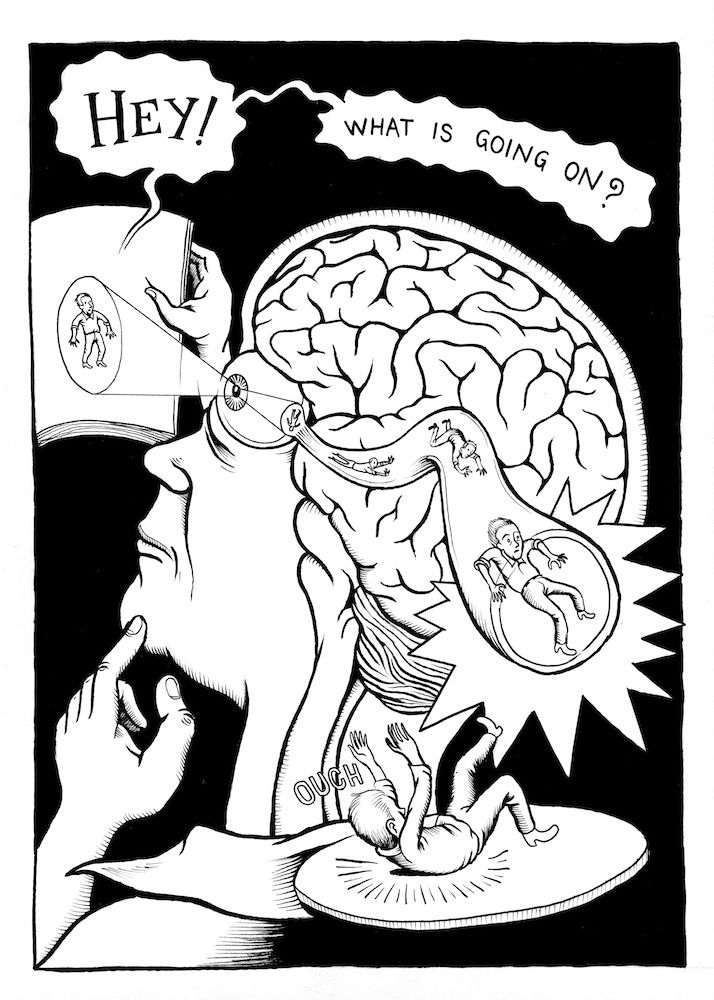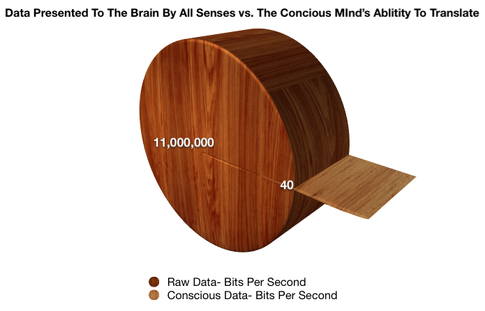For those of you who appreciate a more scientific consideration of the mysterious aspects of the creative process, here’s a site I came across last year that contains respectable responses to the question, “Does the mind record everything that comes through our five physical senses?” These answers include curious references in the field of neuroscience.

From the graphic novel Neurocomic. Published by British indie Press Nobrow.
Brian Roemmele’s response titled, There are at Least Two of You, really got me thinking about the significance of the expressions- “being in the zone” or “getting in the zone” (hang in there as I’ll be linking this up with creative talk further on).
[ Sidebar: This ‘zone’ is frequently mentioned in the realm of sport. I played competitive sport from the age of 10 and I can recall the many times I had practiced enough necessary body movement to not have to think of my game anymore. Athletes often talk about over thinking their game as the moment it all falls apart. I’d say this is the same for playing in a band. Similarly, once I gained a certain familiarity with my instrument, an undeniable freedom from my mind was achieved and as soon as I thought about what I was doing, my playing felt forced and off. This no mind zone could be achieved many many ways through a multitude of activities and I’ll revisit this subject repeatedly. It’s already been written about a tonne…for at least a few thousand years, actually.]
So in Roemmele’s response he basically talks about how (to put it in extremely simplified terms) our unconscious brain is collecting millions of bits of information per second through our sensory organs. Our conscious thinking brain, however, can only process around 40 bits per second (I know, how do they get these numbers?). Roemmele describes it like this:
“All of the senses organs are fed directly to the unconscious mind for processing and are presented to what I will call an Editor’s table. Just like a Movie Editor, the unconscious mind cuts information that it deems not to be relevant and renders this to the conscious mind, with about a half second delay. The merits on what is relevant to the unconscious mind is quite complex and would require a book to detail. In the most simple context preconditioning creates a bias to the Editor, that drops about 99% of the data to the floor that is deemed not relevant for real time decisioning.”

Image from Roemmele’s response
“From a very practical sense, we have developed in a manner to focus on the “relevant” data points presented to our Conscious mind. We are all given a basic blueprint for what is important, like moving away to avert something from striking us. The rest is built on family, cultural and general societal memes and conditioning.”
What I gather from this data is that we have access to a giant pool of information that we collect on an unconscious level. If we attempt to think consciously for an idea or about our performance, we are more limited to what and how we’ve thought before or what we’ve been taught to think, value, believe, recognize etc. The downside of our verbal/language brain realm. This would include self-doubt and dwelling on the past and future.
Every art form I’ve looked into (mathematics included) that acknowledges the elusive quality of the creative process, expresses this need or desire to escape the forced thinking process- a process that involves trying to come up with an idea on command (imagine being handed that marker and a blank piece a paper in a meeting and being told to brainstorm or being told to get out your sketchbook and begin planning).
I’m proposing that it’s possible that when we are excited to create, we are accessing that 11 million bits (or whatever it is) that are being edited out or ignored because that information hasn’t already been indexed. However, I have to point out that our unconscious brain is not some pure open field. We know that our unconscious mind hosts many collected memories so that we are significantly unaware how our current thoughts are greatly influenced or controlled by our perception of past experiences.
Well then, if we can get a handle on our mind (so it’s not controlling us) and bypass our default verbal thinking process that is linked to unconscious memory, maybe we’d be dropping into the source of inspiration; away from our predetermined looping thoughts and ideas to an unlimited multi-dimensional field of immense possibility (the nothing and all zone). And, again, we all have to figure out our own way to do this (with or without the current developing scientific research).
A very little key will open a very heavy door.
-CHARLES DICKENS
*Disclaimer: No copyright infringement intended. I do my best to track down original sources. All rights and credits reserved to respective owner(s). Email me for credits/removal.